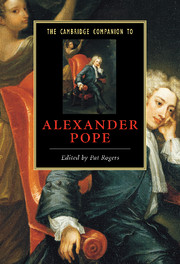Book contents
- Frontmatter
- Introduction
- 1 Pope, self, and world
- 2 Pope’s friends and enemies: fighting with shadows
- 3 Pope’s versification and voice
- 4 Poetic spaces
- 5 Pope’s Homer and his poetic career
- 6 Pope and the classics
- 7 Pope and the Elizabethans
- 8 Pope in Arcadia: pastoral and its dissolution
- 9 Pope and ideology
- 10 Pope and the poetry of opposition
- 11 Crime and punishment
- 12 Landscapes and estates
- 13 Money
- 14 Pope and the book trade
- 15 Pope and gender
- 16 Medicine and the body
- 17 Pope and the other
- Further reading
- Index
3 - Pope’s versification and voice
Published online by Cambridge University Press: 28 April 2008
- Frontmatter
- Introduction
- 1 Pope, self, and world
- 2 Pope’s friends and enemies: fighting with shadows
- 3 Pope’s versification and voice
- 4 Poetic spaces
- 5 Pope’s Homer and his poetic career
- 6 Pope and the classics
- 7 Pope and the Elizabethans
- 8 Pope in Arcadia: pastoral and its dissolution
- 9 Pope and ideology
- 10 Pope and the poetry of opposition
- 11 Crime and punishment
- 12 Landscapes and estates
- 13 Money
- 14 Pope and the book trade
- 15 Pope and gender
- 16 Medicine and the body
- 17 Pope and the other
- Further reading
- Index
Summary
Attending closely to how Alexander Pope's versification - how he makes verses - lets us hear the distinctive voices of his poems. Careful listening pays rich rewards. Without it we may have a hard time getting beyond a first impression, like that of Thomas Berger's young protagonist in Little Big Man, Jack Crabb. Having spent his childhood among the Cheyenne Indians, Jack is adopted by a clergyman whose high-minded wife decides to civilize him by reading Pope to or perhaps at him:
She read me some of that man's verse, which sounded like the trotting of a horse if you never paid attention to the words or didn't understand most of them like me. What I did savvy seemed right opinionated, like that fellow had the last word on everything
This essay attempts to help readers new to Pope hear in his work something more than mechanical monotony and dogmatic pronouncements.
The first step to appreciating Pope's voice is to think of the word as plural: Pope wrote in many voices. He shared with his age a sense of decorum, which does not necessarily mean politeness but rather the idea that different occasions call for different kinds of behavior. Literary decorum means that various styles are appropriate for various kinds of poetry, just as dress differs according to setting:
For diff'rent Styles with diff'rent Subjects sort, As several Garbs with Country, Town, and Court.
(An Essay on Criticism, 324-5)- Type
- Chapter
- Information
- The Cambridge Companion to Alexander Pope , pp. 37 - 48Publisher: Cambridge University PressPrint publication year: 2007
- 4
- Cited by

